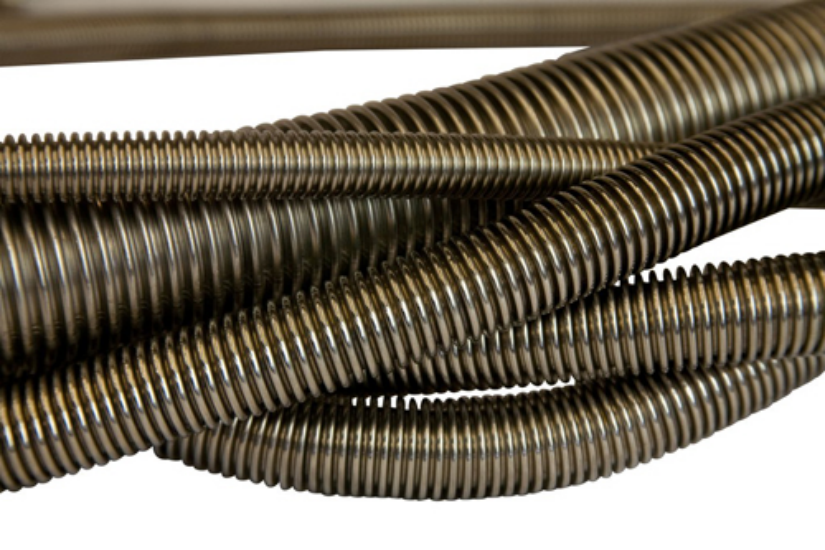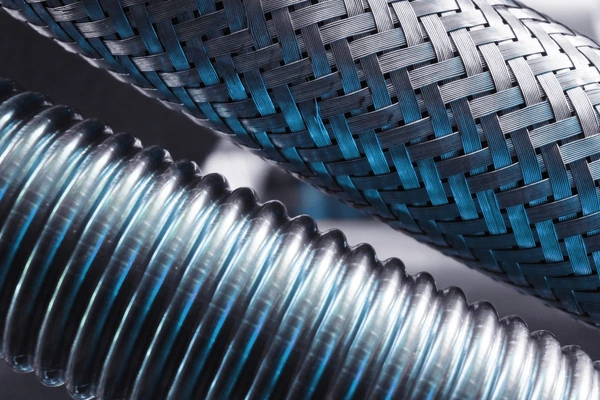Understanding Corrugated Stainless Steel Tubing
What is Corrugated Stainless Steel Tubing?
Corrugated stainless steel tubing (CSST) is a bendable, sturdy, and light piping option. It’s mainly used in plumbing and gas systems. Its wavy outer design allows easy bending. This helps it move around obstacles. It’s a great substitute for stiff pipes in many uses. CSST is crafted from top-grade stainless steel. This resists rust well. It ensures lasting reliability.
Key Features of Corrugated Stainless Steel Tubing
Corrugated stainless steel tubing has unique traits. These make it stand out from other pipes:
- Bendability: Its wavy design lets it curve easily. No extra fittings or joints are needed.
- Rust Resistance: Stainless steel fights off corrosion. It withstands chemical harm. This ensures toughness in tough settings.
- Light Build: CSST is much lighter than rigid pipes. This makes it simple to move and set up.
- Quick Setup: Its flexibility cuts down on cutting or threading. This speeds up installation. It saves time.
Applications of Corrugated Stainless Steel Tubing in Plumbing
Use in Fuel Gas Systems
CSST is popular in fuel gas systems. It handles high pressures and heat well. Its bendability simplifies routing through walls or ceilings. This reduces joints needed. Fewer joints mean fewer leak risks. It boosts safety. Its rust-resistant nature suits indoor and outdoor gas lines.
Role in Heat Exchangers
CSST is used in heat exchangers. It conducts heat well. It resists extreme temperatures. The wavy design increases surface area. This improves heat transfer. Its strength handles thermal stress. It maintains performance in tough conditions.
Comparison with Black Iron Gas Pipes
CSST has clear advantages over black iron pipes:
- Bendability: Black iron needs exact cuts and many fittings. CSST bends easily around obstacles.
- Faster Setup: CSST installs quickly. This cuts labor costs.
- Rust Resistance: Black iron rusts in damp settings. CSST’s stainless steel lasts without wear.
Advantages of Corrugated Stainless Steel Tubing
Bendability and Simple Installation
CSST’s flexibility skips many fittings and joints. This simplifies setup. It lowers leak risks at connections. Its light weight makes handling easy during installation.
Fewer Joints and Fittings
CSST needs fewer joints. This strengthens plumbing systems. Less connections reduce leak or failure chances. It improves safety and dependability.
Toughness and Corrosion Resistance
Stainless steel resists rust naturally. CSST works well in homes or businesses. It handles moisture, chemicals, and temperature changes. It stays strong. This cuts maintenance costs over time.
Qingdao Sunrise New Material Co., Ltd. specializes in custom metal solutions. They support global industries needing high-quality CSST.
Safety Considerations for Corrugated Stainless Steel Tubing
Proper Bonding and Grounding Needs
Corrugated stainless steel tubing is valued for flexibility and strength. It’s widely used in gas systems. Proper bonding and grounding are vital for safety. Bonding connects conductive parts electrically. This prevents voltage differences. These could cause electrical dangers. CSST must link to the building’s grounding system. This reduces risks from electrical surges or lightning.
The National Fire Protection Association (NFPA) sets clear rules. CSST systems need bonding clamps and wires. These connect to the building’s grounding electrode. This cuts the chance of electrical arcing. Arcing can harm tubing. It poses safety risks.
Installation Tips to Avoid Damage or Leaks
Correct installation keeps CSST systems strong. Installers must follow maker guidelines closely. Poor handling or setup can weaken performance.
Key practices include:
- No Sharp Bends: Over-bending stresses the tubing. It raises leak risks.
- Protect from Damage: Shield tubing from impacts or scrapes. Do this during and after setup.
- Secure Fittings: Tighten fittings properly. Ensure leak-free seals. Avoid over-tightening. This can harm threads.
- Leak Testing: Test pressure after setup. Verify all connections are tight. Ensure no leaks exist.
These steps ensure CSST systems work safely. They stay efficient too.
Addressing Lightning Risks with CSST
Risks During Lightning Strikes
Lightning is a concern for CSST. Its thin walls are vulnerable. High-energy surges from lightning can damage it. When lightning hits a building or nearby, it sends currents through conductive materials. CSST can carry these. Without proper bonding, currents cause arcing. This may puncture tubing. It can lead to gas leaks.
NFPA 54, the National Fuel Gas Code, outlines safety rules. These reduce lightning risks for CSST setups.
Ways to Reduce Lightning Hazards
To tackle lightning risks, take these steps:
- Strong Bonding: Follow NFPA bonding rules. This lowers arcing risks.
- Lightning Protection: In lightning-prone areas, use full protection systems. These guide lightning energy to the ground. They protect internal structures.
- Protective Covers: Use sleeves or conduits for CSST. These add a shield against surges or physical harm.
- Regular Checks: Inspect bonding connections often. Look for system weaknesses.
These measures boost safety. They keep CSST’s benefits for gas systems intact.
Frequently Asked Questions
Why is bonding key for CSST?
Bonding stops electrical dangers. It ties CSST to the grounding system. This cuts risks from lightning surges.
What steps ensure safe CSST installation?
Avoid sharp bends. Protect from damage. Secure fittings well. Test for leaks after setup.
Can CSST be used in lightning-prone areas?
Yes, with precautions. Use strong bonding. Add lightning protection systems for safety.
How does grounding help CSST safety?
Grounding sends electrical energy to the earth. It reduces surge or arcing risks.
What upkeep does a CSST system need?
Check regularly. Ensure bonding stays secure. Look for wear or damage.
For custom CSST or metal product solutions, contact Qingdao Sunrise New Material Co., Ltd. They’re ISO9001:2015 certified. They deliver excellence globally.








